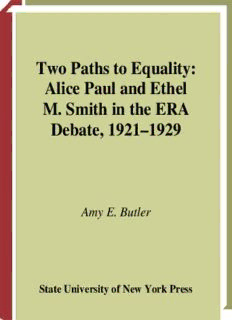
Two Paths to Equality: Alice Paul and Ethel M. Smith in the Era Debate, 1921-1929 PDF
Preview Two Paths to Equality: Alice Paul and Ethel M. Smith in the Era Debate, 1921-1929
Two Paths to Equality: Alice Paul and Ethel M. Smith in the ERA Debate, 1921–1929 Amy E. Butler State University of New York Press Two Paths to Equality Two Paths to Equality Alice Paul and Ethel M. Smith in the ERA Debate, 1921–1929 Amy E. Butler State University of New York Press Cover: The photo of Alice Paul (left) is courtesy of the Alice Paul Centennial Foundation, Inc. and the National Museum of American History, Smithsonian Institute. The photo of Ethel M. Smith (right) is reproduced from the Collections of the Library of Congress. Published by State University of New York Press, Albany ©2002 State University of New York All rights reserved Printed in the United States of America No part of this book may be used or reproduced in any manner whatsoever without written permission. No part of this book may be stored in a retrieval system or transmitted in any form or by any means including electronic, electrostatic, magnetic tape, mechanical, photocopying, recording, or otherwise without the prior permission in writing of the publisher. For information, address State University of New York Press 90 State Street, Suite 700, Albany, NY 12207 Production by Dana Foote Marketing by Anne Valentine Library of Congress Cataloging-in-Publication Data Butler, Amy E., 1965– Two paths to equality : Alice Paul and Ethel M. Smith in the ERA debate, 1921–1929 / Amy E. Butler. p. cm. Includes bibliographical references and index. ISBN 0-7914-5319-7 (alk. paper)—ISBN 0-7914-5320-0 (pbk. : alk. paper) 1. Women’s rights—United States—History. 2. Equal rights amendments—United States—History. 3. United States—Politics and government—1919–1933. 4. Paul, Alice, 1885–1977. 5. Smith, Ethel Marion, 1877–1951. I. Title HQ1236.5.U6 B88 2002 323.3'4'097309042—dc21 2002020823 10 9 8 7 6 5 4 3 2 1 This is dedicated to my step-mother Mary Retan (1921–2001) Contents Acknowledgments / ix Introduction The Elusive Search for Equal Rights in the Twentieth Century / 1 Chapter 1 “To the Victor Belong the Spoils”: The Merits of a Combined Suffrage and Labor Agenda, 1877–1920 / 12 Chapter 2 From Charity Organization to Militant Protest: Alice Paul’s Rise to Prominence, 1885–1920 / 33 Chapter 3 “[S]ome Group of Women Must Keep Developing the Power of Women As a Class”: The National Woman’s Party, 1921–1923 / 55 Chapter 4 “Women’s Biggest Battle Is Yet to Be Fought”: Ethel M. Smith and the Women’s Trade Union League, 1921–1923 / 72 Chapter 5 The ERA v. Women’s Minimum Wage: The Legal Debate Between Paul and Smith, 1921–1923 / 90 Conclusion Two Paths to Equality: The Difference It Makes / 108 Notes / 115 Bibliography / 151 Index / 163 vii Acknowledgments Many librarians and archivists provided essential assistance with this book. I would like to thank the Schlesinger Library staff as well as the archivists at the Li- brary of Congress, National Archives, Swarthmore College, George Washington University, and Vassar College. State University of New York at Binghamton li- brarians Rachelle Moore, Diane Geraci, Cheryl McKee, and Ed Sheppard were in- strumental to the completion of this work. I also am grateful for Amelia Fry’s friendship and many hours of conversa- tion about Alice Paul. Leslie Latham generously shared endless memories about the National Woman’s Party. I will remain eternally grateful to Sarah Elbert for al- ways challenging my most basic assumptions and for being a consistent source of inspiration throughout the length of this project. In addition, I am grateful to Dara Silberstein, Amy Shapiro, Dick Dal¤ume, Carole Turbin, Jean Paquette, Tim Houlihan, Kristen McDonald, Betsy Otto, Dia Black, and Emily Appal. This book certainly could not have been completed without the mentorship of Kathryn Kish Sklar, the leading in¶uence in my committment to women’s and labor history. Her exemplary scholarship on progressive era politics laid the ground- work for this book. I am grateful for the twelve years she committed to working with me, ¤rst as an undergraduate, then graduate student. I have bene¤ted immeasurably, both professionally and personally, from her insight. ix
Description: